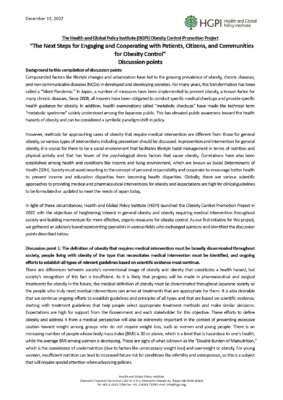[Event Report] The Health and Global Policy Institute Chronic Disease Control Project Holds Advisory Board Meeting for “Engaging and Cooperating with Patients, Citizens, and Communities for Obesity Prevention” (September 22, 2022)
 On September 22, 2022, the Health and Global Policy Institute (HGPI) Chronic Disease Control Project held an advisory board meeting for an initiative titled, “Engaging and Cooperating with Patients, Citizens, and Communities for Obesity Prevention.” The meeting was held online.
On September 22, 2022, the Health and Global Policy Institute (HGPI) Chronic Disease Control Project held an advisory board meeting for an initiative titled, “Engaging and Cooperating with Patients, Citizens, and Communities for Obesity Prevention.” The meeting was held online.
HGPI’s Chronic Disease Control Project is advancing an initiative titled, “Engaging and Cooperating with Patients, Citizens, and Communities for Obesity Prevention” as part of its FY2022 activities.
Compounded factors like lifestyle changes and urbanization have led to the growing prevalence of obesity, chronic diseases, and non-communicable diseases (NCDs) in developed and developing societies. For many years, this transformation has been called a “Silent Pandemic.” To respond to the needs of the modern era, Japan has been advancing measures targeting diseases like diabetes, stroke, and cardiovascular diseases (CVDs). Measures aiming to prevent the exacerbation of chronic diseases have made some progress. For example, since 2008, all insurers have been obligated to conduct specific medical checkups and provide specific health guidance for obesity, a known factor for many chronic diseases. Furthermore, examinations called “metabolic checkups” have made the technical term “metabolic syndrome” widely understood among the Japanese public. This has elevated public awareness toward the health hazards of obesity and can be considered a symbolic paradigm shift in policy.
There has also been progress in obesity research. A clear relationship has been established between obesity and nonalcoholic fatty liver disease (NAFLD), a chronic progressive liver disease that affects an estimated 444 million people globally and 2 to 3 million people in Japan. NAFLD and other obesity-related diseases result in long-term detriments to quality of life (QOL) for patients and their families, meaning early detection and treatment are crucial.
Establishing healthier lifestyle habits through diet and exercise is a vital step for preventing obesity and requires individuals to practice self-management. Correlations have also been established among health and conditions like income and living environment, which are known as Social Determinants of Health (SDH). To prevent disparities in income and education from becoming disparities in health, we must work together to encourage better health as a society.
There are also genetic factors for obesity. Two people who follow identical diets and live in the same environment have different chances of becoming obese. In other words, obesity is not only the result of someone’s lifestyle and living environment, so placing responsibility solely on individuals and communities under the concept of personal responsibility may harm the health of individuals and infringe on their dignity. To avoid being overly reliant on the concept of personal responsibility, certain developed countries are even seeing movements to drop the term, “lifestyle disease.” While maintaining a foundation for non-pharmaceutical interventions, we require systems which provide suitable medical and pharmaceutical interventions to those who need them.
Recognizing these issues, HGPI will advocate for necessary future measures for obesity, a subject which encompasses many key healthcare policy topics of today like SDH, chronic disease self-management, and the growing need for care that is more personalized. We will work toward achieving a society in which people can receive the healthcare services and treatments they need while avoiding unnecessary medicalization of the modern issue of chronic diseases.
At this advisory board meeting, we held a discussion with multi-stakeholders representing industry, Government, academia, and civil society to identify challenges that are likely to emerge when advancing obesity prevention measures, to outline potential next steps, and to examine various items including identifying needs regarding healthcare interventions, establishing social support, improving lifestyles for individuals, and promoting research.
■ Advisory board members (titles omitted; in Japanese syllabary order)
- Kyoko Ama (Representative, Children and Healthcare Project)
- Yuko Oguma (Associate Professor, Sports Medicine Research Center, Graduate School of Health Management, Keio University)
- Iwao Kurose (Executive Director, Japan Medical Association)
- Naoki Kondo (Professor, Graduate School of Medicine and Faculty of Medicine, Kyoto University)
- Ichiro Tatsuno (Chairman, Japanese Society for Treatment of Obesity; President, Chiba Prefectural University Of Health Sciences)
- Shoichiro Tsugane (President, National Institute of Health and Nutrition, National Institutes of Biomedical Innovation, Health and Nutrition)
- Koutaro Yokote (President, Japan Society for the Study of Obesity; Director General, Chiba University Hospital)
■ Observer
Health Service Division, Health Service Bureau, Ministry of Health, Labour and Welfare



